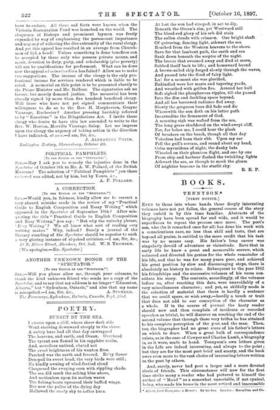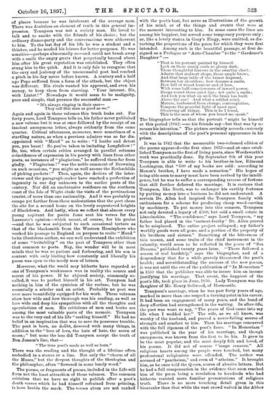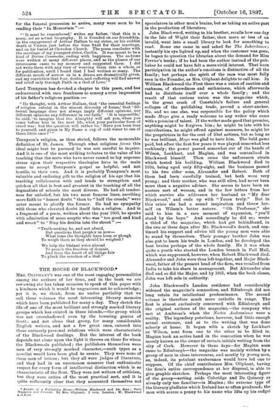BOOKS.
TENNYSON.* [FIRST NOTICE.] EVEN to those into whose hands these deeply interesting volumes have not yet fallen, the general course of the story they unfold is by this time familiar. Abstracts of the biography have been spread far and wide, and it would be superfluous to repeat the process once more. The poet's son, who (be it remarked once for all) has done his work with a conscientious care, no less than skill and taste, that are beyond all praise, is entitled to the more credit that his task was by no means easy. His father's long career was singularly devoid of adventure or vicissitude. Save that in early life he knew a great and memorable sorrow, which coloured and directed his genius for the whole remainder of his life, and that he was for many years poor, and achieved his great position by slow and discouraging steps, there is absolutely no history to relate. Subsequent to the year 1842 his friendships and the successive volumes of his verse con- stitute his story. The contents, accordingly, of the volumes before us, after reaching this date, were unavoidably of a very miscellaneous character ; and yet, so skilfully made is the selection of material that there is hardly a sentence that we could spare, or wish away,—hardly a touch or trait that does not add to our conception of the character as a whole. If in the course of perusal the hasty reader should now and then complain of incidents or recorded speeches as trivial, he will discover on reaching the end of the second volume that through these very trifles he has attained to his complete perception of the poet and the man. Then, too, the biographer had no great store of his father's letters on which to draw. When a great bulk of correspondence exists, as in the case of Cowper and Charles Lamb, a biography is, as it were, made to hand. Tennyson's own letters given in the Life are indeed interesting, and always to the point ; but they are for the most part brief and scanty, and the book owes even more to the vast choice of interesting letters written to the poet by others.
And, surely, never had poet a larger and a more devoted circle of friends. This circumstance will now for the first time strike many a reader who had pictured to himself the author of " Maud " as a somewhat unsociable, if not cynical, being, who made his home in the most retired and inaccessible
• Alfred, Lord Tennson: a Ifemoi... B hi3 Son. London : Macmillan and Co
of places because he was intolerant of the average man. There was doubtless an element of truth in this general im- pression. Tennyson was not a society man. He loved to talk and to smoke with the friends of his choice ; but the ordinary dinner-party and the conversazione were abhorrent to him. To the last day of his life he was a student and a thinker, and he needed his leisure for better purposes. He was sensitive—perhaps abnormally so—and could not brush away with a smile the angry gnats that perpetually buzzed about him after his great reputation was established. They often stung him to the quick. And it is only fair to recognise that the envy and jealousy of the unsuccessful poet had reached a pitch in his day never before known. A century and a half ago Pope suffered from a form of the attack, but the object was different. His rivals wanted his approval, and even his money, to keep them from starving. "Your interest, Sir, with Lintot ! " Nowadays it would seem to be malignity, pure and simple, that pursues the successful man :—
" It's always ringing in their ears—
They call this man as good as me."
Again and again in these volumes this truth leaks out. For forty years, Lord Tennyson tells us, his father never published a new volume but it was at once followed by the receipt of an insolent anonymous letter, always evidently from the same quarter. Critical utterances, moreover, were sometimes of a startling nature, as when a previous admirer was so far dis- appointed with "Maud" as to write : "I loathe and detest you, you beast ! So you've taken to imitating Longfellow !" So, too, when certain critics arranged in parallel columns coincidences of expression in his poetry with lines from other poets, as instances of "plagiarism," he suffered them far from gladly. " Plagiarism ! " was the noble comment of Browning on such occasions, "you might as well accuse the Rothschilds of picking pockets I " Then, again, the devices of the inter- viewer and the paragraph-maker have reached a perfection of ingenuity in our day unknown to the earlier poets of the century. Nor did an unobtrusive residence on the southern coast of the Isle of Wight elude the visits of the pertinacious tourist, of more than one nationality. And it was probably to escape yet farther from these molestations that the poet chose the site for a second home on the lovely sequestered heights of Blackdown. And lastly, when we reflect that almost every young aspirant for poetic fame sent his verses for the Laureate's opinion—which meant, of course, for his praise —and that he was subjected to such occasional torture as that of the blacksmith from the Western Hemisphere who worked his passage to England on purpose to recite " Maud " to its illustrious author, we can well understand the exhibition of some "irritability" on the part of Tennyson other than that common to poets. Nay, the wonder will be in most minds that be was so patient and forbearing, and his son is content with only hinting how constantly and liberally his puree was open to the needy man of letters.
Moreover, what the world may hitherto have regarded as one of Tennyson's weaknesses was in reality the source and secret of his power. If be abjured society, commonly so- called, it was to perfect himself in his art. Tennyson had nothing in him of the cynicism of the recluse, but he was essentially a scholar and an artist. Probably no poet was ever more bountifully equipped for his work. These volumes show how wide and how thorough was his reading, as well as how wide and deep his sympathies with all the thoughts and speculations of men. His criticisms of men and books are among the most valuable parts of the memoir. Tennyson was to the very end of his life "making himself." He had no belief in an inspiration that was to save its possessor trouble. The poet is born, no dofibt, dowered with many things, in addition to the "love of love, the hate of hate, the scorn of scorn;" but none the less did Tennyson accept the truth of Ben Jonson's line, that— "The true poet's made as well as born."
There was the reading and the thought of a lifetime often embodied in a stanza or a line. Not only the "charm of all the Muses," but the deepest thoughts of the theologian and the philosopher, often "flowered in some lonely word."
The poems, or fragments of poems, included in the Life will form not the least attraction of these volumes. The common criticism that we have no right to publish after a poet's death verses which he had himself refrained from printing, is here beside the mark. The verses given are not ranked with the poet's best, but serve as illustrations of the growth of his mind, or of the things and events that were at the moment interesting to him. In some cases the lines are among his happiest, but served some temporary purpose only ; or, like a lovely stanza in Gray's Elegy, were omitted, as dis- turbing the proportions of the poem for which they were first intended. Among such is the beautiful passage, at first de- signed as a Prologue or "Ante-Chamber "to the "Gardener's Daughter"
"That is his portrait painted by himself. Look on those manly curls so glossy dark, Those thoughtful furrows in the swarthy cheek ; Admire that stalwart shape, those ample brows, And that large table of the breast dispread. Between low shoulders; how demure a smile, Row full of wisest humour and of love,
With some half-consciousness of inward power. Sleeps round those quiet lips; not quite a smile ; And look you what an arch the brain has built Above the ear ! And what a settled mind, Mature, harboured from change, contemplative, Tempers the peaceful light of hazel eyes. Observing all things. This is he I loved, This is the man of whom you heard me speak."
The biographer tells us that the portrait "might be himself at this period (1842) —so his friends say—but that was by no means his intention." The picture certainly accords curiously with the descriptions of the poet's personal appearance in his prime.
It was in 1842 that the memorable two-volumed edition of the poems appeared—the first since 1832—and at once estab- lished Tennyson as the first of living poets, since Wordsworth's work was practically done. By September 8th of this year Tennyson is able to write to his brother-in-law, Edmund Lushington, that "500 of my books are sold : according to Moxon's brother, I have made a sensation." His hopes of being able soon to marry must have been revived by the intelli- gence, but he was to suffer a corresponding reverse of fortune that still further deferred the marriage. It is curious that Tennyson, like Scott, was to endanger his earthly fortunes by putting money into a business he did not understand. A certain Dr. Allen had inspired the Tennyson family with enthusiasm for a scheme for producing cheap wood-carving by machinery. To put money into this concern, Tennyson not only devoted a legacy of £500, but sold a small estate in Lincolnshire. "The confidence," says Lord Tennyson, "my father had placed in the ' earnest-frothy ' Dr. Allen proved to be misplaced. The entire project collapsed ; my father's worldly goods were all gone, and a portion of the property of his brothers and sisters." Something of the bitterness of this season, and some traits of the chief instrument in the calamity, would seem to be reflected in the poem of "Sea Dreams," published twenty years later. "There followed a season of real hardship," says the biographer, and of a despondency that for a while gravely threatened the poet's health; and notwithstanding the success of the new poems, it was not until the eve of the publication of "In Memoriam" in 1850 that the publisher was able to insure him an income justifying his marriage. That event, the happiest of the poet's life, took place in June, 1850. Lady Tennyson was the daughter of Mr. Henry Sellwood, of Homcastle.
Tennyson's marriage, when he was past forty years of age, marked in more than one respect a turning point in his career. It had been an engagement of many years, and the bond of deep affection had strengthened in the waiting. In after-life, the poet was wont to say, "The peace of God came into my life when I wedded her." The wife, as we all know, was worthy of the husband, and proved a never-failing source of strength and comfort to him. Then his marriage concurred with the full ripeness of the poet's fame. "In Memoriam" was published in the year of his marriage, and though anonymous, was known from the first to be his. It grew to be the most popular, and the most deeply felt and loved, of his poems. It did not of course "scope censure." All religious hearts among the people were touched, but many professional religionists were offended. The author was accused of "pantheism," and even of "atheism." It brought him, as he once told the Queen, scores of abusive letters. But he had a full compensation in the evidence that soon reached him of the poem being a revelation to hundreds who had hitherto resisted more familiar presentations of religious truth. There is no more touching detail given in this biography than that while the vast crowd waited in the Abbey
for the funeral procession to arrive, many were seen to be reading their "In Memoriam ":—
" ' It must be remembered,' writes my father, 'that this is a poem, not an actual biography. It is founded on our friendship, on the engagement of Arthur Hallam to my sister, on his sudden death at Vienna just before the time fixed for their marriage, and on his burial at Clevedon Church. The poem concludes with the marriage of my youngest sister, Cecilia. It was meant to be a kind of Divina Commedia, ending with happiness. The sections were written at many different places, and as the phases of our intercourse came to my memory and suggested them. I did not write them with any view of weaving them into a whole, or for publication, until I found that I had written so many. The different moods of sorrow as in a drama are dramatically given, and my conviction that fear, doubts, and suffering will find answer and relief only through Faith in a God of Love.'"
Lord Tennyson has devoted a chapter to this poem, and has endeavoured with rare frankness to convey a true impression of his father's religious position :—
"He thought, with Arthur Hallam, that 'the essential feelings of religion subsist in the utmost diversity of forms,' that 'dif- ferent language does not always imply different opinions, nor
different opinions any difference in real It is impossible,' he said, 'to imagine that the Almighty will ask you, when you come before him in the next life, what your particular form of creed was : but the question will rather be, Have you been true to yourself, and given in My Name a cup of cold water to one of these little ones ? '"
Tennyson's religion, as thus stated, follows the memorable definition of St. James. Through what religions forms this ideal might best be pursued be was not careful to inquire. And it is one of the most striking tributes to the value of his teaching that the sects who have never ceased to lay supreme stress upon their respective theologies have in the main come to accept Tennyson's gospel as helpful, and not hostile, to their own. And it is probably Tennyson's most valuable and enduring gift to the religion of his age that his teaching collaborates with and tends to strengthen and quicken all that is best and greatest in the teaching of all the dogmatists of schools the most diverse. He had all tender- ness for unbelief, but his two most famous lines, ascribing more faith to "honest doubt "than to "half the creeds," were never meant to glorify the former. He had no sympathy with those who elevated doubt itself into a religion. And in a fragment of a poem, written about the year 1860, he speaks with admiration of some sceptic who was "too good and kind and sweet" to "fling his doubts into the street" "Truth-seeking he, and not afraid, But questions that perplex us now—
What time (he thought) have loom or plough To weigh them as they should be weighed ?
We help the blatant voice abroad To preach the freedom of despair.
And from the heart of all things fair To pluck the sanction of a God."








































 Previous page
Previous page